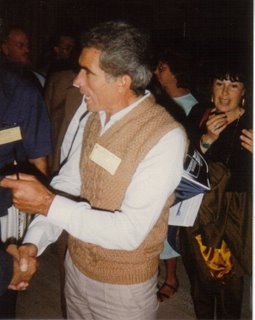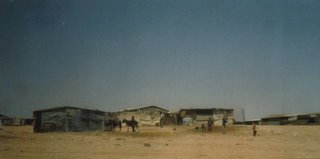Israel's Bedouin refuse to "disappear"
NOT FAR FROM BE'ERSHEVA
ISRAEL's Bedouin have been called the 
"invisible minority", and the
"forgotten Palestinians".
Nuri el-Okbi (right, at UN-NGOs conference in Geneva, 1990) is making sure their problems aren't hidden from sight, and their rights are not forgotten.
The Bedouin are Israeli citizens. Some even serve in the army. The soldier found guilty of firing the shot that killed British photographer Tom Hurndall was a Bedawi. But while the Bedouin traditional way of life has been rendered unlivable, and they are constatly harried to supposedly make them "fit in" with the modern state, as Arabs they cannot choose where to live and work,
and as Bedouin they are forced out on the margins, treated
as a "problem" that ought to disappear.
There are about 100,000 Bedouin in the Negev and 35,000 in Galilee. In 1947 there were 65,000 in the Negev, but after the war only 11,000 remained. Bedouin were forced into Egypt, Gaza and Jordan. Expulsions continued until 1959. Today's Negev Bedouin are confined to about 10% of the area they once had. They claim they should own at least a million dunams, one twelfth of the Negev, basing this partly on registered titles but mostly on generations of unwritten agreement among tribes. Most Galilee Bedouin, by contrast, have registered titles. The Israeli state has not recognised traditional ownership, and many Bedouin villages are not recognised.
In 1960, travelling through the Negev, I saw Bedouin labourers working on the road down into the Makhtesh Ramon crater. It was very hot, and they were very grateful for some water we gave them. Our Israeli guide told us they were only paid half what a Jewish labourer would get.
Moshe Dayan came up with his proposal for the Bedouin when he was Agriculture Minister in the early 1960s:
"We should transform the Bedouin into an urban proletariat in industry, services, construction and agriculture. 88% of the Israeli population are not farmers, let the Bedouins be like them. Indeed, this will be a radical move which means that the Bedouin would not live on his land with his herds, but would become an urban person who comes home in the afternoon and puts his slippers on…The children would go to school with their hair properly combed. This would be a revolution, but it may be fixed within two generations. Without coercion but with government direction... this phenomenon of the Bedouins will disappear."
Note, Dayan was not talking about providing opportunities or attacting Bedouin into the cities, where they are not wanted anyway, but of depriving them of what they had, their freedom, their independence, their place in the land. A policy of clearances.
In 1965 the Israeli government approved the Planning and Construction Law as well as an outline plan in which hundreds of Bedouin villages and localities were deliberately ignored and considered not to exist. The lands were classified as agricultural land, rendering all buildings erected as illegal.
In 1976, under Yitzhak Rabin, the notorious "Green Patrol" was created – a paramilitary wing of the State, whose methods exceed gentle coaxing. The purpose of the Green Patrol is to expel the Bedouin from their lands and concentrate them in the development towns. But "development" has been a misnomer in Israel, even for Jewish immigrant towns. The places designated for Bedouin lacked investment, facilities or jobs, and were off the beaten track.
The Bedouin are not inherantly "primitive" or "backward", they are not resistant to change if it is for the better. But they resist being shoved around as inferiors, and want to participate in progress as equals, human beings, treated with respect. In 1986 I saw where the army had destroyed two Bedouin shacks, simply because they hadn't permission. This was on rough high ground near the expanding new Israeli town of Karmiel, in western Galilee. As we were returning to our bus a bunch of small girls appeared to look at these funny tourists who had stopped by their way. Between giggles and shyness at the cameras, they told us that yes, the army had been there a couple of days before, and they had been frightened naturally. Then they told us happily how they could now take the bus to school where they used to have to walk a long way.
A few days later, we went to Be'ersheva, once a Bedouin market town, where the central mosque they built was being turned by the Israelis into a museum, as yet with little to show. Its tall minaret was overshadowed by the taller radio masts of the Israeli army Southern Command nearby.
Down a lane we entered a schoolroom where Bedouin adults were attending classes, and here we met Nuri el Okbi, founder of the Association for Bedouin Rights. He took us out to visit Bedouin living in a makeshift village, and we heard about their lives. The men went into Be'ersheva to work in construction, but now had to take a detour because residents of the smart new Jewish suburb they had helped to build did not want Arabs walking through the neighbourhood. The young girls left to tend flocks were being harassed by the "Green Patrols", who would take away animals, and beat or arrest you if you protested.
Nuri El-Okbi still remembers the day his tribe were forced off their land, a temporary move they were told, to clear it for army manouvres. First there had been harassment, ampounting to terror, then in 1951 they were told to move. "At sunrise army trucks came, loaded us and our belongings," El-Okbi says. The trucks made several trips back and forth to the Hura area northeast of Beersheba, a few miles from the Jordanian lines.
"There was nothing there. The army brought water in tankers, and when the rains began the tankers stopped coming. " Many tribesmen have dispersed, but some stayed in what became a crowded cluster of dwellings, some of which were built illegally at night. Dirt paths wind through Hirbet Hura past discarded garbage.
The El-Okbis are among 70,000 Bedouins who live in 45 "unrecognized villages" in the Negev, often on or near lands they claim. "Since those communities are not recognized, they have received no infrastructure and services and in many places they lack running water, electricity, roads, or sewage, clinics and schools," a state commission of inquiry reported 11 months ago.
http://washingtontimes.com/upi-breaking/20040805-083959-1160r.htm
Nuri el-Okbi has taken his fight both to the Israeli public and to audiences overseas. In some parts of Israel Bedouin are now being helped by more enlightened local communities and groups like the Israel Committee Against House Demolitions (ICAHD) and Rabbis for Human Rights, as well as Palestinian organisations. But their struggle continues, and the harassment and persecution by the state has got worse.
(It has also been to the Occupied Territories, where the military has tried to drive Bedouin from caves near Hebron, and settlers have poisoned their wells.)
On 14 February 2002, the Israel Lands Administration (ILA), which controls most of the land inside Israel, destroyed approximately 12 square kilometers of grain crops planted by Bedouin residents of the Naqab (Negev). During the operation, toxic chemicals were sprayed on the crops, including lands inside Bedouin villages where farmers were working in their fields and over the village of Khirbet al-Watan where several hundred students were attending classes. The ILA claims that the crops were planted ‘illegally’ on ‘state land.’
http://www.arabhra.org/factsheets/factsheet3.htm
On February 1, 2005, in the early hours of the morning, the state organized more raids to wreck Bedouin agricultural work, destroying close to 5000 dunams (about 1200 acres) belonging to the El Okbi, Altori, Abu Madigum and Abu Siam tribes. The Israel Committee Against House Demolitions reported a year ago: "Personnel of the government's Land Office and the "Green Patrol" invaded the Bedouin land, accompanied by hundreds of ordinary policemen, Border Policemen and fully armed and equipped soldiers, having at their disposal everything from horses to helicopters. They had all come to convoy and guard the demolition contractors, who had the best of agricultural equipment - which they used not in order to prepare the land for planting, but on the contrary to destroy and ruin the agricultural work of their Bedouin fellow citizens. This act is clearly illegal. It is illegal even under the recently enacted "Squatter Removal Amendment" whose whole purpose is evicting and removing the Bedouin citizens of Israel from their land - land which is deemed to be "state land" regardless of the generations that they lived and worked on it. Even under this harsh and manifestly unjust law, the government is supposed to give the inhabitants a warning in advance and give them time to protest or challenge the act in a court of law. This requirement the government arrogantly ignored, sending their troops in without any warning. http://www.icahd.org/eng/news.asp?menu=5&submenu=1&item=225
Nuri el Okbi is due to speak in London on Tuesday night.
SOAS Palestine Society
Presents:
The Bedouins of the Negev
Discriminated Minority
A lecture by
Nuri el Okbi
The Association for the Defence of the Bedouins Rights
Tuesday 14th Feb
7pm
Khalili Lecture Theatre
SOAS Main Building
Free Entrance and No Need for Booking
SOAS Palestine Society
Thornhaugh Street
Russell Square, London
WC1H 0XG
Email:palsoc@soas.ac.uk
http://www.palestinesociety.org/
Labels: Bedouin


1 Comments:
Interesting and informative post about a forgotten subject.
Post a Comment
<< Home